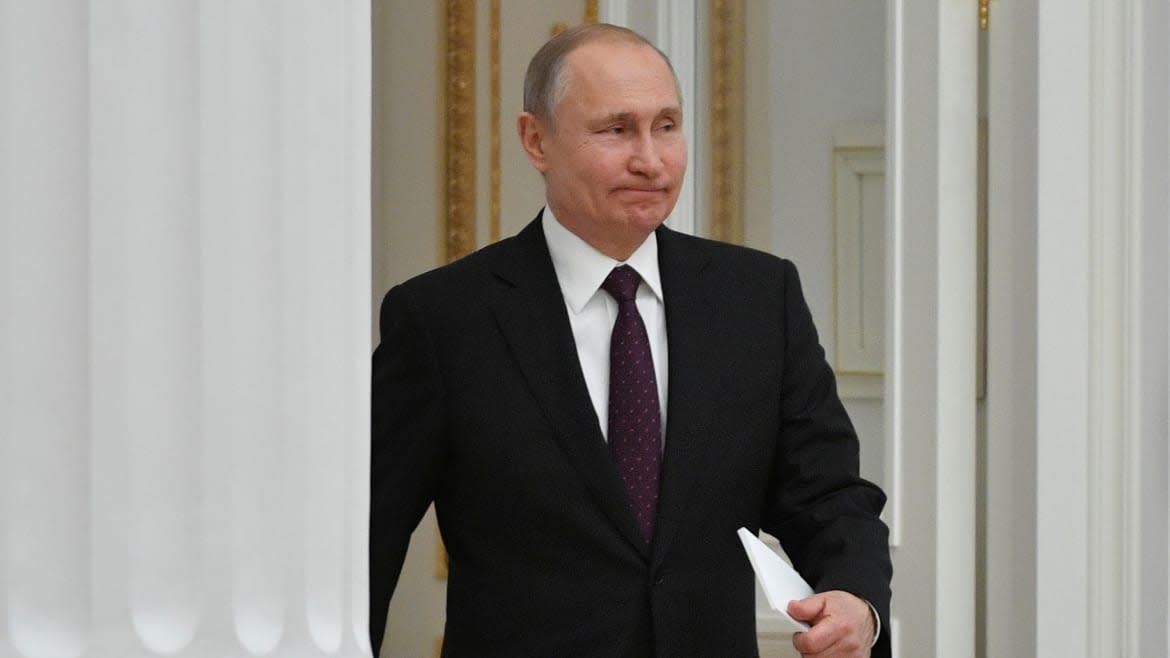Russia’s Mueller Report: If Putin Did It, He Did It for You

Russian state-TV viewers on Thursday were delivered a different conclusion from Robert Mueller’s report: Putin always wins. And now everyday Russians are going to win, too.
In the rest of the world, the Justice Department’s redacted version of the special counsel’s report concluded Moscow interfered in the 2016 presidential election “in sweeping and systematic fashion.” He identified numerous links between the Kremlin and the Trump campaign, establishing that “the Russian government perceived it would benefit from a Trump presidency and worked to secure that outcome, and that the campaign expected it would benefit electorally from information stolen and released through Russian efforts.”
On Friday, the Kremlin issued a scathing response, feigning disappointment with the investigation’s quality, questioning whether it was a waste of taxpayers’ money, and falsely claiming the report doesn’t contain “a single piece of evidence” of Russian intervention in 2016.
Willfully ignoring Mueller’s conclusions, Russian government officials appeared greatly encouraged by the lack of further indictments stemming from the investigation. Parroting President Trump’s narrative, state-media outlet RT on Thursday posted the link to Mueller’s report, prefaced by: “SPOILER ALERT: No ‘collusion’” “Collusion” has no legal definition and is not a federal crime—therefore, the Mueller report did not make a determination on “collusion.”
Unburdened by the facts, Russian state-TV hosts and experts were happy to repeat Trump’s mantra—“No collusion, no obstruction”—throughout the investigation.
They seem further emboldened by the recent visit by Fiona Hill, a Trump adviser who held talks in Moscow on April 17 with several Russian officials. U.S. Special Envoy on North Korea Steven Biegun is also in Moscow this week, ahead of the upcoming meeting between Russian President Vladimir Putin and North Korean leader Kim Jong Un. Vladimir Soloviev, host of Russian state-TV shows Moscow. Kremlin. Putin and The Evening, proudly surmised that Americans can’t solve any problems without Moscow, and are “wavering” and ready to talk. The host and experts jointly concluded that Trump’s hands seem to be untied, because the Mueller investigation’s ending has opened a new era of diplomatic relations between the White House and the Kremlin.
Collusion and obstruction denials aside, there were begrudging acknowledgments that the Mueller report did indeed confirm Moscow’s campaign of election interference.
Nevertheless, Kremlin-controlled state media on Thursday was encouraging its audiences with the notion that economic sanctions have now been exhausted and will soon be replaced with conciliatory gestures. Average Russians are being sold on the idea that Putin’s long-term strategy is bound to pay off. According to the Russian state TV, Putin always wins—even when he loses.
That trusty narrative also surfaced in the special counsel’s investigation.
Heavily redacted sections of Mueller’s report revealed that “at approximately 2:40 a.m. on Nov. 9, 2016, news reports stated that candidate Clinton had called President-elect Trump to concede,” prompting an unnamed individual, who traveled to New York alongside the Kremlin’s spokesman Dmitry Peskov, to send a message to the CEO of the Russian Direct Investment Fund (RDIF), Kirill Dmitriev. The message was simple: “Putin has won.”
This line of thinking wasn’t limited to communications taking place behind the scenes. In recent years, Russian state media has made a habit out of boasting about the Kremlin’s successful influence operation, brazenly asserting “Trump is ours,” mocking the American intelligence community for sleeping “while Russia elected a new U.S. president,” and joking that U.S. lawmakers traveled to Russia “to make deals with our hackers so they can rig the midterms in favor of Trump’s team.” In line with Trump’s “locker-room talk” explanations, the Kremlin’s mouthpieces have consistently claimed these statements are meant only as jokes or sarcasm. In reality, they represent a thinly veiled pride at the reach and success of Russia’s ongoing info-ops against the U.S. Experts say a coordinated online disinformation campaign targeting 2020 elections is already underway, using techniques developed and refined by the Kremlin during the U.S. presidential elections in 2016.
Evgeny Popov, the host of 60 Minutes, the most popular state TV program in Russia as of 2018, is defiant about the findings in the Mueller report. Popov tells me: “Soon, we will help you elect Trump once again. Just like the last time. Get ready!”
Got a tip? Send it to The Daily Beast here

